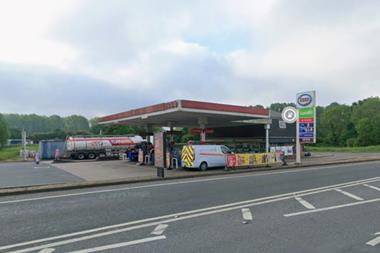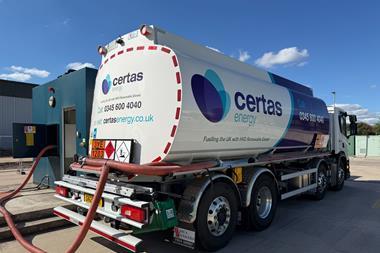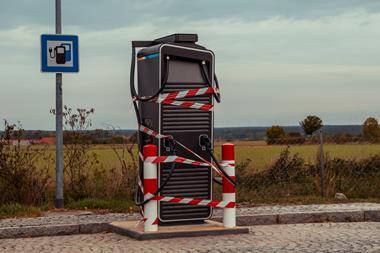As the giants of the fuel industry continue to prune their branches, it lets in more light for the smaller brands to flourish. And so it is for The Maxol Group, the Irish, family-owned oil company, which is finding that while life at grass roots level is still tough – particularly following the arrival of the supermarkets – there are positive signs for the future.
Its recent acquisition of 13 Esso-owned forecourts in Northern Ireland – and thus the departure of a major competitor – means it can move another notch up on the scoreboard. Now Shell is selling off all its Irish forecourts – another chink of light.
Tom Noonan is chief executive of The Maxol Group – which is owned by the McMullan family – as well as chairman of the Irish petroleum Industry Association: “We’ve gone from being a company that, whenever there was a rumour in the marketplace that someone was for sale, people would say it must be the McMullan’s selling Maxol. But now every time there’s a rumour, people say it must be Maxol that’s going to buy something. It was widely expected that we would buy Shell – and obviously we haven’t. But it is known that we’re interested in expansion opportunities.”
Indeed in recent years Maxol has acquired Connors Fuels Ltd, a leading domestic fuels company; and Estuary Fuels, a Limerick-based version of Maxol. It has also expanded its operations into the direct supply of domestic heating oil – Maxol Direct.
Noonan says the interesting change in Ireland is that while the market is dominated by big brands, the big brands are now showing every sign of losing interest in Ireland, as the economy matures: “They’ve gone from having fairly large numbers of employees with a local management structure with a fair degree of independence, to having small numbers of employees with very little local input, so the policy is being dictated from as far away as Budapest and so on. The big oil companies have consolidated and integrated into unified pan-European structures and that has made them more remote from the market. That means their concentration is almost entirely focused on the bigger markets now.
“Shell has effectively announced its withdrawal from the whole of the Irish market. Esso has decided to re-trench and only concentrate on the greater Dublin area. Texaco – it’s hard to know what it’s doing – but in the UK the company has announced its intention to dispose of its retail assets, so it’s reasonable to assume it’ll probably follow suit here.”
Statoil is currently the market leading oil company in the Republic on the retail side, followed by Texaco; then Shell, Esso and Maxol – although with Esso’s change of strategy its share is more concentrated. The dominant player in the North is the John Henderson Group, the wholesaler which acquired the networks of BP and Shell, and which owns the Spar franchise for NI. It claims to have about 50 service stations.
The Maxol Group has a network of 41 co-owned sites and 51 dealers in NI, and 70 co-owned sites and 114 dealers in the Republic. It also has 16 Estuary-branded sites, which will retain Estuary branding.
“We’ve always felt we’re probably the third biggest on the island in terms of retail presence, but even that I think is changing,” says Noonan. “We’ll be moving up that list.” He believes people are the company’s strong point, and the only way to really manage them is to be close to them: “When I joined here in 1980 we ran all of our co-owned stations ourselves, which was crazy. Now technology has come on leaps and bound – but you’re still relying on people. This remote control thing doesn’t work. Virtually all of our co-owned sites are run by licensees. Not every day has been a rosy one in terms of finding the right licensees, but by and large we have now reached the stage where we think it is probably the most successful approach to petrol retailing in the country.
“Our dealers are also extremely important to us – and although the market for independents is consolidating, they are basically setting the trend in the Irish market – their offering is second to none.”
The Irish fuel market is behind the mainland in terms of its experience of supermarkets, which arrived in NI in 1995 and now number 23, having grabbed more than 23% of the fuel market. In the Republic the market had price control until 1990. With a normal economic model in play, competition kicked in, bringing about a greater focus on prices, and reduction in forecourts. This has been accelerated by the arrival of Tesco’s in the Republic in February 2003 – it now has a total of about six superstores.
“Tesco’s started using motor fuels as a means of attracting people into the supermarket,” says Noonan. “Its agenda was different from ours. Ours was to have good quality convenience stores attached to filling stations. The Tesco offer was more a filling station in the car park of a big supermarket.
“We’d done a lot of homework looking at what happened in England particularly. I suppose the lesson we learned was that you had to have a good convenience store offering – you have to maximize the non-fuel element of the site. For a long time we weren’t exactly known for our investment in the business.
“We changed our policy in a couple of ways in the mid-90s. One was to consolidate our business – instead of having separate operating companies north and south we developed into, effectively, a single unit. We also decided we had to be bigger. So we sought out ways and means of growing the business. We had to have a better offering and concentrate on the non-fuel elements – convenience stores and better quality car washes.
“We had been fairly consistent investors in the NI market and when the supermarkets came we turned the tap off a little bit in NI and turned the tap on in the Republic. There was more work to be done in the south as well, and also signs of economic boom which we wanted to take advantage of. All the economic factors favoured expansion in the south – car sales have grown from about 160,000 to 200,000. We came from a nation of secondhand cars to a nation of new cars within a short number of years. Everyone wants to keep their new car clean! The growth in disposable income was quite significant as well. There is a young population coming through who want to own cars, they don’t want to cook, they want to buy food on the move – all those lifestyle changes, in areas we wanted to grow in as well.”
The McMullan family business had been good at buying land, so a lot of the opportunities related to sites the company had already. By spending money on them throughput grew dramatically. In 1996 Noonan and Brian Donaldson, general manager, marketing and retail of The Maxol Group looked at various options on shop development.
“We decided the best way, for a number of reasons, was to latch onto an established convenience brand – one that could give us presence north and south. Mace is the one that came closest to fulfilling that requirement. There are a number of different bodies who have the franchise here, but the umbrella organisation had ambitious plans for a new image, bigger marketing budget and all the rest. A branded Mace store gave us an uplift of 20-25% versus an unbranded Mace.
“Now we’re coming to the end of that 10-year refurbishment programme in the south. Our new flagship Lucan site in West Dublin – an investment of five million Euros – is one of the last, and most expensive.
“We’re going back into NI now – we’ve announced a £5m investment programme for the new Esso stations we’ve acquired. We really want to put our money where we think we’ll see the return. We’ve probably done almost as much as we feel we need to do in the Republic for now, so we’ve re-focused again in the North where we haven’t done as much because of the depressed state of that market.
“I think the NI market will continue to suffer from the great distortion brought about by much higher excise duty (making the pump-price differential 16ppl higher on petrol in the North and 20ppl higher on diesel). I don’t see that gap being narrowed dramatically or sufficiently over the next five years. There’s still a very large illicit business still being transacted.”
Maxol’s Quality Assured Scheme in NI enables the company to do spot checks on fuel sold on its forecourts and reassure customers of its quality, as smuggled or laundered fuel can cause damage to their vehicles.
Noonan says that unlike the other players in the NI market, Maxol hasn’t thrown its hands up in the air and said there’s no way it can make money.
“We lost money for about five years in a row in NI. We didn’t lose money last year. We’ve got a lot of pieces of the jigsaw in place – strength in the business in the hope that the market will start to recover at some point. It’s the early stages of change in the Republic, with the supermarkets. It’s easing slightly in the North, but there is still pain in that market.
“We’ve stayed, the others have left, and that is now creating opportunities for us,” stresses Noonan. “We had to make sure that we dug in, and were prudent about how we maintained our presence in the market. Then when we see an opportunity arising, move quickly on it. In our company if we get a good idea today we can make a decision about it tomorrow. We don’t have money in the kitty, but if the right opportunity arises we certainly have the resources to go after it.”



























No comments yet